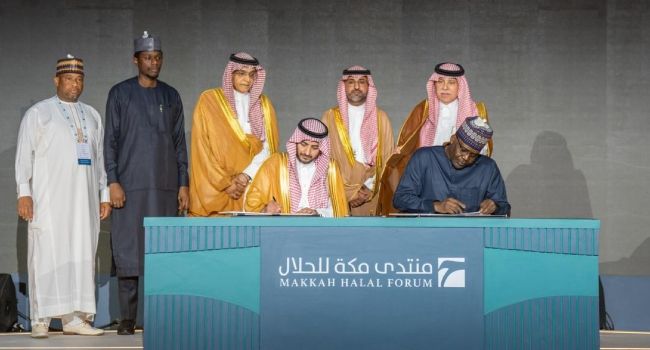
The Federal Government of Nigeria has signed a groundbreaking deal with Saudi Arabia’s Halal Products Development Company (HPDC) to position Nigeria as a key player in the $7.7 trillion global halal market.
The agreement, finalized on Wednesday in Saudi Arabia, was hailed as a “game-changer” by Vice President Kashim Shettima. He emphasized that the pact would transform Nigeria into a global halal economic powerhouse.
Shettima stated, “This agreement aligns perfectly with the Renewed Hope Agenda by creating new jobs, attracting foreign direct investment, and diversifying our economy.” He highlighted that the halal economy extends far beyond Muslim-majority countries, citing examples of non-Muslim-majority nations such as Brazil, Australia, and Thailand, which have already leveraged the sector for substantial export growth.
The deal will foster investment, technical cooperation, and market access in crucial sectors such as food production, pharmaceuticals, finance, and livestock for both nations. Shettima’s media aide, Stanley Nkwocha, quoted him as saying that the agreement will benefit both countries and is a vital step in Nigeria’s ambition to tap into the lucrative halal market.
Representing Shettima at the signing, Deputy Chief of Staff to the President, Ibrahim Hadejia, reiterated the importance of the collaboration, stating, “This collaboration is a crucial step in our goal to make Nigeria a leading global player in the halal industry. We are committed to using this partnership to create jobs, attract foreign investment, and diversify our economy.”
The agreement was signed with HPDC, a subsidiary of Saudi Arabia’s Public Investment Fund, represented by its CEO Fahad Alnuhait. The event was attended by key figures, including Saudi Arabia’s Minister of Commerce, Majid bin Abdullah Al-Qasabi, and prominent leaders from the Makkah Halal Forum and the Makkah Chamber of Commerce and Industry.
At the signing ceremony, Aliyu Bunu Sheriff, Special Assistant to the President on Export Promotion, noted that the agreement builds on Nigeria’s growing Islamic finance sector, which has seen significant successes, including the issuance of Sukuk bonds for infrastructure development and the establishment of Islamic banks like Jaiz Bank, Taj Bank, and Lotus Bank. Sheriff further explained that the Islamic Development Bank (IsDB) and the Arab Bank for Economic Development in Africa (BADEA) would support the initiative through capacity-building efforts, regulatory framework development, and financing opportunities.
The Nigerian delegation also included key figures such as Alhaji Muhammadu Ladan Dikko, Chairman of Dar Al Halal Group; Mansur Muhtar, Chairman of the Bank of Industry; and Jumoke Oduwole, Minister of Trade and Investment, among others. The deal aims to open up new avenues for trade and investment, making Nigeria a prominent player in the global halal economy.





